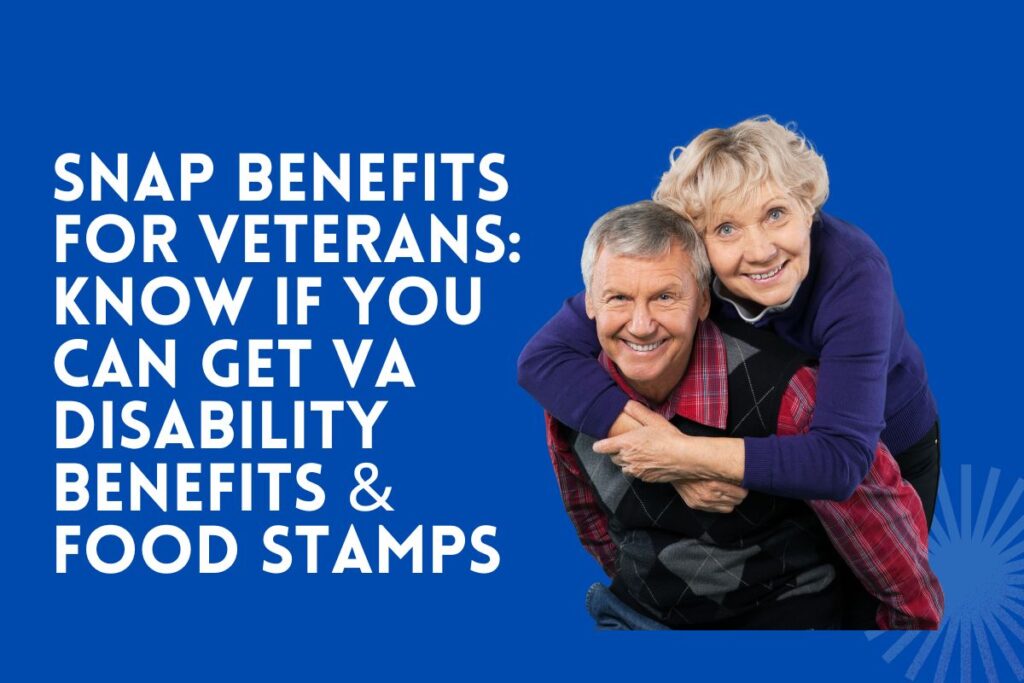Low-income individuals can get assistance from the government Supplemental Nutrition Assistance Program (SNAP) to purchase food. The Food Stamp Program was the name of this massive government nutrition aid program before it was expanded. Millions of Americans have benefited from this aid program by being able to purchase the food they require to keep healthy.
However, a huge number of low-income Veterans who meet the SNAP Benefits for Veterans 2024 Eligibility and are experiencing food insecurity are not using their benefits. Veteran eligibility for SNAP assistance may depend on meeting certain requirements related to family size, resources, and income. These requirements are compared to federal poverty limits that are determined and overseen by the state in which you reside.
SNAP Benefits for Veterans
Each year, millions of families get assistance from SNAP, and among these beneficiaries are retired veterans of the armed forces. Veterans are eligible for SNAP Benefits for Veterans. The federal income tax exclusion of veterans’ benefits and disability pension payments may be available to service members with disabilities related to their military service. Presently, the number of veterans registered in the SNAP Benefits program is more than 1.2 million. Unfortunately, a much too high percentage of those who qualify for the program never take use of their advantages.
Benefits are available to active duty personnel of the United States armed forces as long as they fulfill certain income and other conditions. Even if not every member of the household qualifies, families can still get SNAP benefits for veterans. All veterans will be pleased to learn that they are also eligible for food stamps or SNAP assistance. Up to 18 million adult Americans are veterans, and a large percentage of them are over 65, have a handicap, or both.
In addition to physical issues and disability, many veterans may experience homelessness. Veterans who served in the military may experience physical and psychological problems. Veterinarians incur much more personal expenses as a result of diseases, bad health, and a lower quality of life brought on by service-based impairments. A vet may find it more important to spend money on items other than food if they are dealing with housing challenges, paying for supplies they need, or paying medical costs.

Can you get VA Disability benefits and food stamps?
Low-income households can get food supplements via Supplemental Nutrition Assistance Program (SNAP). Food stamp benefits were formerly known as SNAP food supplements. Yes veterans can get this benefit. The state in which you reside sets and oversees the particular resource and income restrictions that you must fulfill in order to be eligible and submit an application for SNAP assistance.
Most of SNAP rules are applicable to every home. However, the program also has unique qualifying requirements for those with impairments and older persons, regardless of age. Accordingly, you may be eligible for and get SNAP food assistance even if you reside with other people or receive other benefits like Supplemental Security Income (SSI) and/or Social Security Disability Insurance (SSDI).
SNAP Benefits for Veterans 2024 Eligibility
Individuals with impairments and older persons, regardless of age, are also subject to particular qualifying requirements for the program. If you fit the following criteria and are a veteran over or disabled, you may be eligible for SNAP benefits:
- Your monthly net worth must not exceed 100% of the federal poverty threshold. (In 2024, the federal poverty level for single people in the contiguous 48 states is $1,255 per month; in Hawaii and Alaska, it is somewhat higher.)
- Your assets must be $4,250 or less.
Your gross income less any permitted deductions equals your net income. Additionally, assets are “countable resources” like cash, bank account funds, and specific automobiles. Any battle pay, hostile fire pay, or imminent danger pay does not go against your income when you apply for SNAP if you are a combat veteran. Even if you already receive benefits like SSI and/or SSDI, you may still be eligible for SNAP food assistance. If all members of your home get SSI payments, you can be considered to “categorically” qualify for SNAP assistance and not be required to fulfill the net income criteria.
How SNAP works for Veterans
- An electronic benefits transfer (EBT) card will be issued to those who qualify. Supermarkets and convenience businesses approved by the SNAP program accept this card for purchases of food. There is also the location factor. Each month, the authority loads money into EBT card, that can only be used to buy food.
- The granting of applications does not require veterans and their families to sit on the waiting list. They will get the benefits as long as they meet the income and job conditions. After SNAP Benefits for Veterans 2024 Application is approved, non-veterans must wait around thirty days before receiving benefits.
- Moreover, families may only take use of the benefits during the duration of their certification. The family will get notice stating that they must recertify in order to keep receiving assistance.
How to apply for this benefit
The biggest government food aid program is called SNAP. It is intended for those with modest incomes. Consequently, individuals will only be qualified if they fulfill the following requirements. The location affects how the SNAP application is filled out.
Applying for Veteran food stamps requires contacting the appropriate state agency and filling out an application, which varies based on the state in which the applicant resides. In addition to filling out applications online from the state agency’s website, several states also let you complete this by getting in touch with your local SNAP office.

